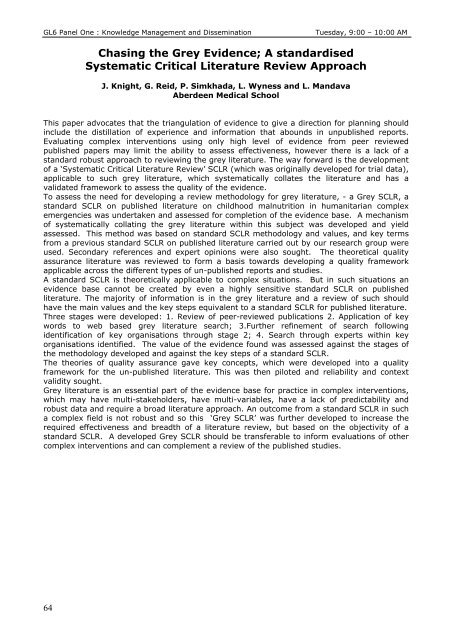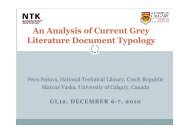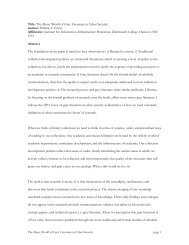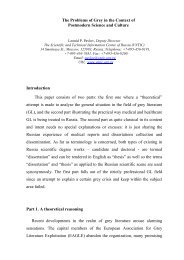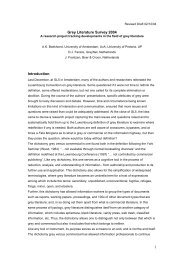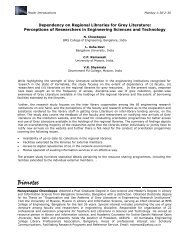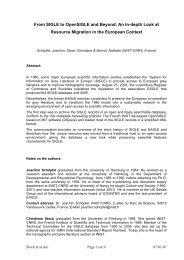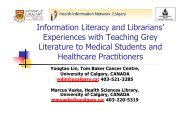A standardised Systematic Critical Literature Review ... - OpenGrey
A standardised Systematic Critical Literature Review ... - OpenGrey
A standardised Systematic Critical Literature Review ... - OpenGrey
You also want an ePaper? Increase the reach of your titles
YUMPU automatically turns print PDFs into web optimized ePapers that Google loves.
GL6 Panel One : Knowledge Management and Dissemination<br />
Tuesday, 9:00 – 10:00 AM<br />
Chasing the Grey Evidence; A <strong>standardised</strong><br />
<strong>Systematic</strong> <strong>Critical</strong> <strong>Literature</strong> <strong>Review</strong> Approach<br />
J. Knight, G. Reid, P. Simkhada, L. Wyness and L. Mandava<br />
Aberdeen Medical School<br />
This paper advocates that the triangulation of evidence to give a direction for planning should<br />
include the distillation of experience and information that abounds in unpublished reports.<br />
Evaluating complex interventions using only high level of evidence from peer reviewed<br />
published papers may limit the ability to assess effectiveness, however there is a lack of a<br />
standard robust approach to reviewing the grey literature. The way forward is the development<br />
of a ‘<strong>Systematic</strong> <strong>Critical</strong> <strong>Literature</strong> <strong>Review</strong>’ SCLR (which was originally developed for trial data),<br />
applicable to such grey literature, which systematically collates the literature and has a<br />
validated framework to assess the quality of the evidence.<br />
To assess the need for developing a review methodology for grey literature, - a Grey SCLR, a<br />
standard SCLR on published literature on childhood malnutrition in humanitarian complex<br />
emergencies was undertaken and assessed for completion of the evidence base. A mechanism<br />
of systematically collating the grey literature within this subject was developed and yield<br />
assessed. This method was based on standard SCLR methodology and values, and key terms<br />
from a previous standard SCLR on published literature carried out by our research group were<br />
used. Secondary references and expert opinions were also sought. The theoretical quality<br />
assurance literature was reviewed to form a basis towards developing a quality framework<br />
applicable across the different types of un-published reports and studies.<br />
A standard SCLR is theoretically applicable to complex situations. But in such situations an<br />
evidence base cannot be created by even a highly sensitive standard SCLR on published<br />
literature. The majority of information is in the grey literature and a review of such should<br />
have the main values and the key steps equivalent to a standard SCLR for published literature.<br />
Three stages were developed: 1. <strong>Review</strong> of peer-reviewed publications 2. Application of key<br />
words to web based grey literature search; 3.Further refinement of search following<br />
identification of key organisations through stage 2; 4. Search through experts within key<br />
organisations identified. The value of the evidence found was assessed against the stages of<br />
the methodology developed and against the key steps of a standard SCLR.<br />
The theories of quality assurance gave key concepts, which were developed into a quality<br />
framework for the un-published literature. This was then piloted and reliability and context<br />
validity sought.<br />
Grey literature is an essential part of the evidence base for practice in complex interventions,<br />
which may have multi-stakeholders, have multi-variables, have a lack of predictability and<br />
robust data and require a broad literature approach. An outcome from a standard SCLR in such<br />
a complex field is not robust and so this ‘Grey SCLR’ was further developed to increase the<br />
required effectiveness and breadth of a literature review, but based on the objectivity of a<br />
standard SCLR. A developed Grey SCLR should be transferable to inform evaluations of other<br />
complex interventions and can complement a review of the published studies.<br />
64
GL6 Panel One : Knowledge Management and Dissemination<br />
Tuesday, 9:00 – 10:00 AM<br />
Author Information:<br />
Dr. Padam Simkhada (B. Ed., M.Sc., PhD) is working as an International Research Fellow in<br />
the Department of Public Health at the University of Aberdeen UK. Padam graduated from<br />
Tribhuvan University, Nepal. He completed a M.Sc. in Health Promotion from Brunel University,<br />
London in 1999 and PhD from Southampton University UK in 2002. Padam worked for Ministry<br />
of Health in Nepal and Save the Children (UK) for several years. He has long experience in<br />
reproductive and sexual health issues, particularly in the areas of HIV/AIDS.<br />
Padam Simkhada’s main research interest is in international health, working on migration, sex<br />
trafficking and sexual health. He has great interest in the use of grey literature to inform<br />
evidence-based decision-making in the field of emergency nutrition. He is convener of<br />
International Health Interest Group in Aberdeen.<br />
Dr. Jane Knight (BSc, MB ChB, MPH, MFPHM) trained as a Consultant in Public Health<br />
Medicine in Scotland. Her background includes National Health Service Board research. She<br />
now holds a joint post for food borne disease and nutrition as Clinical Senior Lecturer at the<br />
University of Aberdeen and Public Health Medical Advisor for the Food Standards Agency<br />
Scotland. In addition she is an Honorary Consultant at the Scottish Centre for Infections and<br />
Environmental Health.<br />
The combination of an academic approach to service lead research, and training in public<br />
health disaster relief has resulted in a developing public health epidemiological research<br />
portfolio in malnutrition in complex emergencies. Jane leads a research group Partners<br />
Research Emergency Nutrition PREN, collaborating with humanitarian Non Government<br />
Organisations. From her research experience assessing evidence required for policy decisions<br />
within complex situations, both within UK and in the international humanitarian field, her<br />
research work now has a focus on methodological development required for assessing the<br />
evidence from the grey literature.<br />
Laura Wyness (BSc, MSc) graduated with a BSc Health Sciences degree from the University<br />
of Aberdeen in 2000. Following this she worked as a Research Assistant on several systematic<br />
reviews and trials within the Health Economics Research Unit (HERU) and the Health Services<br />
Research Unit (HSRU) at the University of Aberdeen.<br />
Laura gained an MSc in Public Health & Health Services Research (with distinction) in 2003<br />
from the University of Aberdeen. Her MSc dissertation, carried out within the PREN group<br />
(Partners for Research into Emergency Nutrition) was on “developing an evidence-based tool<br />
for redefining an approach to severe malnutrition in complex emergencies”.<br />
In 2003 she was awarded an MRC (Medical Research Council) scholarship to carry out a PhD in<br />
the Public Health Department, University of Aberdeen. The PhD is being carried out in the area<br />
of severe adult malnutrition in complex emergencies.<br />
Address:<br />
Dr. Jane Knight<br />
Univeristy of Aberdeen<br />
Public Health Medical Advisor Food Standards Agency Scotland<br />
Public Health, Polwarth Building, Foresterhill<br />
Aberdeen AB25 2ZD<br />
United Kingdom<br />
j.knight@abdn.ac.uk<br />
www.abdn.ac.uk/public_health.<br />
65


